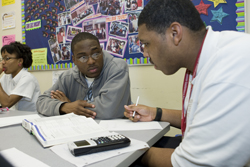Increasing the number of male mentors of color
| The United Way of Southeastern Pennsylvania has awarded the Russell Conwell Center a grant to fund a new program designed to increase the number of male mentors of color.
The newly formed RCC Mentor Support Network will identify, select and train African American, Latino, Asian and Native American Temple students to mentor local youth who are enrolled in the university’s Upward Bound programs. “Having a mentor helps young, male students reconstruct their idea of what it takes to be successful,” said Michael Stokes, director of the Russell Conwell Center. “They can better find their path when they have access to successful young men who have already overcome some of the challenges they are currently facing.” |
 Photo by Joseph V. Labolito/Temple University
On weekdays, Chibuikem Okoro (left), a civil engineering major, tutors and mentors students like Gregory Jackson, a senior at the Philadelphia Military Academy, as part of the Temple Upward Bound Program. A new program funded by a grant from the United Way of Southeastern Pennsylvania hopes to train Temple undergraduates like Okoro to become mentors.
|
|
|
|
|
A recent study by the Harvard Family Research Project concluded that participants in intensive one-on-one mentoring programs achieved a 3 percent higher GPA. Program participants also skipped 52 percent fewer days of school and 37 percent fewer classes than their counterparts. Mentors work on building relationships with the students and guide them in making positive choices when confronted with life's challenges, said Stokes. For the last six months, Larif Hamm, a junior in the Fox School of Business, has been volunteering his time with the Upward Bound after-school program, an all-year pre-college program for low-income, potential first generation college students enrolled at Thomas Edison, Simon Gratz, Abraham Lincoln, Benjamin Franklin and Kensington high schools. During a typical session he tutors several students in math and English. “I find that some students get discouraged and don’t want to take the time to apply to college,” said Hamm. “We try to make sure that they don’t get overwhelmed.” Hamm had several mentors as a young student, and decided that he could play an important role in the lives of young men who might not have had the same opportunity. The new batch of mentors will complete 10 hours of training and an orientation program. “The ultimate vision of the mentor network is to develop a supportive community where students pursue academic success while developing into knowledgeable, well-rounded citizens,” said Stokes. |
|